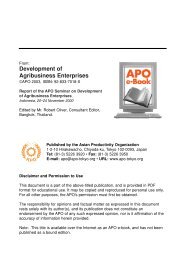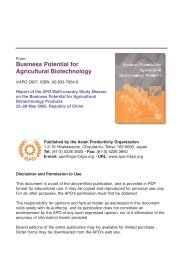Annual Report 2009 - Asian Productivity Organization
Annual Report 2009 - Asian Productivity Organization
Annual Report 2009 - Asian Productivity Organization
You also want an ePaper? Increase the reach of your titles
YUMPU automatically turns print PDFs into web optimized ePapers that Google loves.
INDIVIDUAL-COUNTRY PROGRAMS<br />
56<br />
a few model companies and/or organizations are<br />
selected each year. They receive management advice<br />
from APO experts who visit several times per year or<br />
stay in the country for a longer duration in the case<br />
of APO/United Nations Volunteer experts. At the<br />
end of the project, a local dissemination seminar is<br />
organized, and a manual and video CD are produced<br />
and distributed to other companies and organizations<br />
to share the achievements of the model companies/<br />
organizations.<br />
Bilateral Cooperation Between NPOs<br />
(BCBN)<br />
The APO sponsors NPO participants who wish to<br />
become involved in training courses, conferences,<br />
and other special programs organized by other NPOs<br />
through the BCBN Program. Opportunities are also<br />
provided for high-level officials, policymakers, and<br />
opinion leaders in APO member countries to visit one<br />
or more other developed member countries to gain<br />
knowledge from their experiences and transfer such<br />
knowledge to participants’ home countries.<br />
OSM<br />
The Individual-country Observational Study Mission<br />
(I-OSM) Program aims at enhancing the capabilities<br />
of NPOs and member countries in their pursuit of<br />
productivity improvement. Under this program,<br />
member countries depute a mission(s) to one or more<br />
other member countries to study and observe recent<br />
developments and best practices in a particular area of<br />
interest relevant to the needs of the deputing country.<br />
To assist the capacity building of the requesting<br />
countries effectively, I-OSMs are aligned with the<br />
identified needs of each country. This helps member<br />
countries build their capacity and be more competitive<br />
by learning best practices from other member<br />
countries.<br />
In <strong>2009</strong>, eight I-OSMs were organized in cooperation<br />
with the host NPOs. These included the Philippines<br />
to Thailand (12 members) on OTOP benchmarking,<br />
Sri Lanka to Malaysia (17 members) on public-sector<br />
productivity, Nepal to India (14 members) on rice<br />
mill technology, the Republic of Korea to Japan (six<br />
members) on industrial educational organizations,<br />
Malaysia to the Republic of Korea (seven members)<br />
on natural farming, Nepal to India (eight members)<br />
on gemstone extraction technology, Vietnam to the<br />
Republic of Korea (eight members) on the customer<br />
satisfaction index, and Indonesia to the Republic of<br />
Korea (12 members) on productivity improvement in<br />
organizations. The duration of the missions ranged<br />
from five to 10 days. Each comprised site visits to<br />
model organizations to observe the best practices and<br />
hold meetings with productivity experts.<br />
TES<br />
In <strong>2009</strong>, 44 experts were deputed to conduct 37<br />
projects under TES. The member country that benefited<br />
the most was the Republic of China with seven,<br />
followed by India and Malaysia with five. Fourteen<br />
experts came from Japan, while 11 were from the<br />
USA, four from Malaysia, three from Australia, two<br />
from India, and one each from Canada, Costa Rica,<br />
Hong Kong, Republic of China, Republic of Korea,<br />
Singapore, Sweden, Switzerland, Thailand, and the<br />
UK. Some of the subject areas for which expert<br />
services were requested were knowledge management,<br />
the balanced scorecard, and food safety management<br />
systems.<br />
Development of Demonstration Companies/<br />
<strong>Organization</strong>s<br />
The demonstration projects undertaken by the APO<br />
are to demonstrate practical application of productivity<br />
tools and techniques in the industry, service, and<br />
agriculture sectors. Demonstration companies convey<br />
success stories on the development and implementation<br />
of productivity improvements and initiatives<br />
undertaken to all stakeholders. Demonstration/model<br />
organizations, companies, and communities showcase<br />
the tangible results of productivity improvement<br />
programs and encourage others to undertake similar<br />
efforts.<br />
Japanese expert (center) advising staff of demonstration model<br />
companies and MPC officers, Malaysia<br />
In <strong>2009</strong>, two demonstration company projects were<br />
undertaken, each of 12 to 18 months’ duration in<br />
Malaysia and Vietnam in association with the MPC<br />
and VPC, respectively. The Malaysian project focused<br />
on total quality management systems under the thrust<br />
area of enhancing applications of productivity and<br />
quality in the country. The demonstration companies<br />
are M/s Zamria Sdn. Bhd., M/s Autokeen Sdn. Bhd.,<br />
and M/s Selia-tek Industries Sdn. Bhd., all in Selangor.<br />
The project in Vietnam focused on the application<br />
of lean Six Sigma in the service sector, and the dem
















